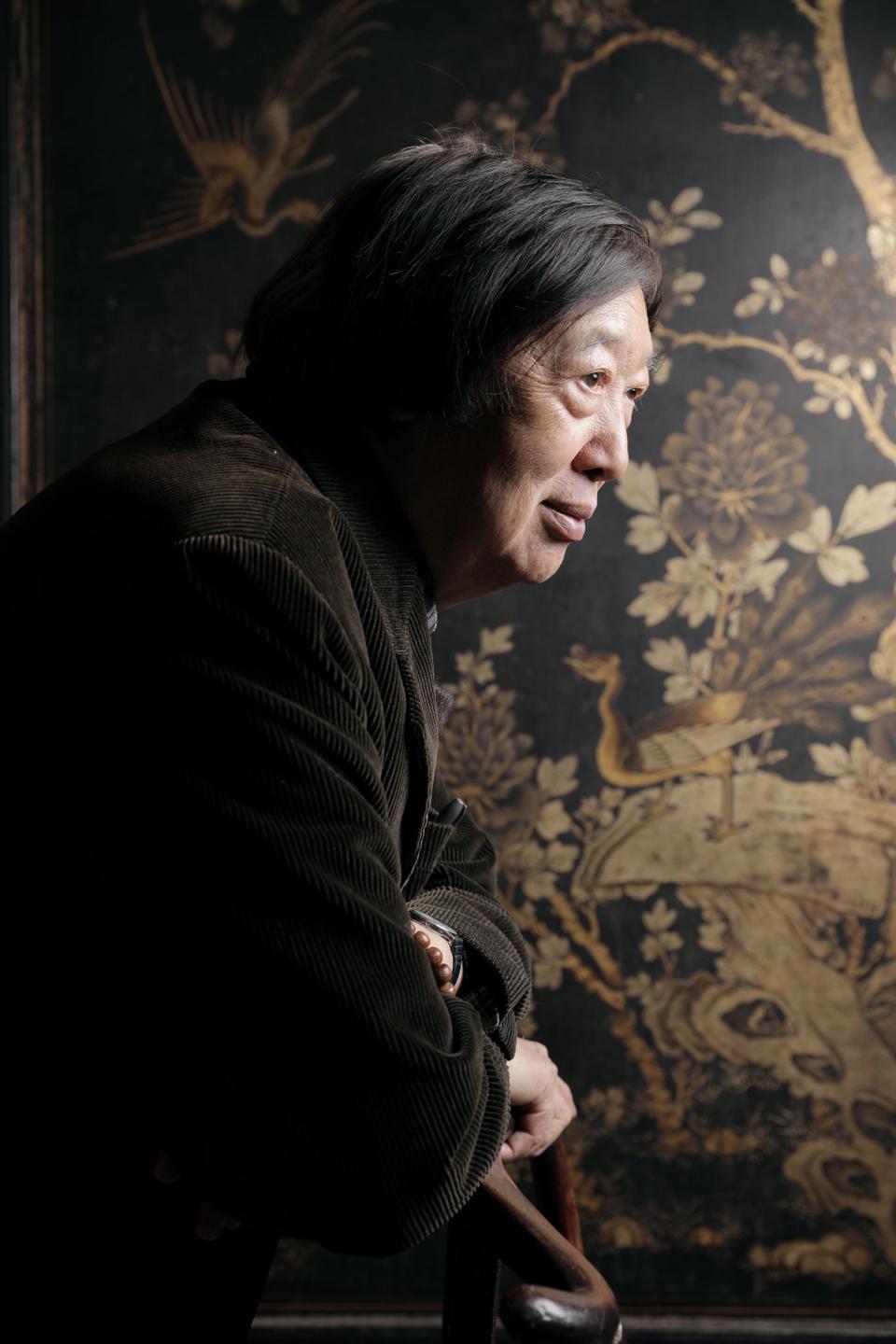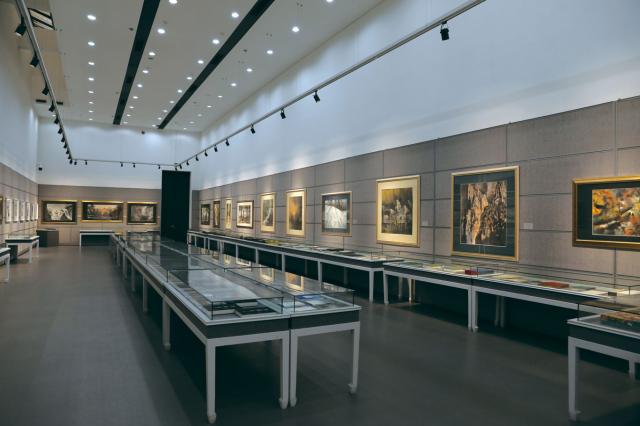Tianjin, according to Chinese writer Feng Jicai, is typical of a place where Chinese and foreign culture mix, following waves of colonizers in the late 19th century as a result of the Second Opium War and the Treaty of Tianjin in 1858, and the later occupation by foreign armed forces after the Boxer Rebellion of 1900.
Growing up in one of the former foreign concessions in Tianjin, the 77-year-old writer was imbued with historical tales and legends of the ancient city, which endowed his novels with strong local color. However, Feng does not accept his novels simply being labeled “folk” or “historical” as some critics have done. He emphasized during his interview with NewsChina that many of his novels are more a representation of the clash between traditional and new cultures, or between Chinese and Western culture, which he believes is worth reflecting on, even today.
His latest novel, Monocular Telescope, tells how Ouyang Jue, son of a typical Chinese Confucian businessman, has a love affair with Sana, daughter of a French military officer, and how their love turns to tragedy amid the Boxer Rebellion. According to Feng, the novel was based on a similar tale he heard from his father and he aimed to embody the Sino-Western cultural clash through a simple love story.
“It is indeed amazing that [the old] Tianjin was partitioned into the old city and the foreign concessions where two sharply different cultures, including languages, lifestyles and worldviews, clashed with each other... People in those ‘two cities’ were curious about each other and also rejected each other, from which all sorts of legends arose. This has given me abundant material to write novels,” Feng wrote in the Shanghai-based paper, Wenhuibao.
According to Feng, Monocular Telescope uses many symbols to represent Chinese and foreign cultures. The ancient Chinese Scholar tree that shades Ouyang’s courtyard symbolizes traditional Chinese culture. The character’s wife is an idealization of a traditional Chinese woman who is supposed to be tender, virtuous and reserved. Meanwhile, Ouyang’s lover Sana is a lively, open and frank Western woman. Their stories come to a climax in the flames of war, when the ancient tree crashes down on Ouyang’s home.
As a communication tool between Ouyang and Sana, the monocular telescope (a small hand-held device) carries such significance that Feng used it to title the novel. “In that era, the world’s communication was one-way and non-understandable just as people peeped at each other with a monocular telescope – biased and distant,” he said.
Despite a 600-year history, Tianjin did not rise until after 1860 when it was forced to open as a treaty port. Foreign businessmen flooded the city, establishing factories which powered the city to become the economic center of northeastern China and the country’s second commercial and port city following Shanghai.
The rise, however, came at the cost of blood and humiliation. Nine foreign countries set up concessions in and around Tianjin, the total area of which had expanded to eight times that of the old city by the early 20th century. Tianjin natives held a complex attitude toward the concessions – they felt curious about and jealous of the new city, but were hostile to and awed by it. Those in the foreign concessions did not welcome outsiders – the British Concession, for example, issued a regulation in 1866 that forbade Tianjin locals from leasing or building houses in the concession. Such mutual rejection and isolation widened the cultural and psychological gap between the residents of the two cities.
Monocular Telescope, according to literary critic Li Yongdong, is a display of cultural differences via spatial differences, namely, in and outside the foreign concessions. In the novel, Ouyang Jue is from a notable local family and lives in the old city, while the heroine Sana is from a military family and lives in a red mansion in the French Concession. The two characters meet in Ouyang’s paper store. Their love is exciting, but also full of misunderstanding through language and cultural barriers. She can’t read his name, and he is struck by the Western things she shows him – including the titular telescope.
Feng had the lovers meet in an abandoned white building between the old city and the foreign concessions as a way to indicate that the cross-border love affair can only exist in a vacuum where nobody needs to have an identity. Yet, love cannot be isolated from reality for too long, and the turbulent times intrude on the lovers as a battle rages around them.
Feng drew on a real-life battle called the Gengzi Incident in 1900 (named after the Gengzi year in China), when an alliance of military forces from eight countries marched from Tianjin to Beijing, forcing the Qing emperor to flee the imperial palace. Tianjin suffered bombardments which killed many residents. In the novel, Feng details how the once flourishing city was razed to the ground, with bodies littering the streets and the smell of blood filled the air. Feng said that as he wrote the novel, he pictured how Sana and Ouyang’s wife were abused and humiliated, but he could not bear to write it. “I cried over their tragic fates... I seldom cry when I’m writing,” he wrote in Wenhuibao.
“The tragic ending actually expresses my reflection about the Sino-Western cultural clash in this period of transition as China was stepping toward modernity,” he told NewsChina. “Imagine we use the monocular telescope with one eye. It is selective and partial. From an angle of love, we may see beauty. From a humane angle, we may see the needs of communication. From a cultural angle, we may see curiosity, and from a historical angle, we may see the negative sides of the other side,” he said.
“All the characters in the novel are using a monocular telescope [to see the other side].”
This thinking is also reflected in Feng’s other novels about Chinese traditional culture. Monocular Telescope is the last volume of a series about cultural reflection. The novella Miraculous Pigtail (1987) talks about the long braid Chinese men had to wear during the Qing Dynasty (1644-1911) and The Three Inch Golden Lotus (1994) had as its theme the bound feet women were forced to have. Eight Trigrams (1988) is themed around the symbols of Taoism and concepts of yin and yang.
According to critic Li Yongdong, Feng has created a new style of Tianjin folk novels. Different from Beijing or Shanghai folk novels, which either write about old traditions or new local characteristics, Feng’s novels mix the vulgar with the elegant, the old with the new, and the Chinese with the foreign. While writing about the grass-roots or marginalized people, Feng instills in his characters his understanding and reflections on the national culture, especially people’s psychological changes in the transition from the old traditions to modern things. Many characters in Feng’s novels express anxiety about identity and tradition. When the characters choose to abandon an old tradition and embrace the new, they always find they cannot cut off their connection with the old. For example, in Miraculous Pigtail, the hero
finally cuts off his pigtail which he has been using as a whip to fight bad guys and becomes a gunner in the Boxer Rebellion, but he partly kept his nickname, changing it from “sharp whipper” to “sharp gunner.” In The Three-Inch Golden Lotus, Niu Junying, a leader of the anti-bound feet campaign, finds that a leading bound feet supporter Ge Xianglian was her mother who married into a rich family due to her beautiful bound feet, but not wanting her daughter to suffer the same pain, she sent her away.
“Characters walking between new and old either go toward traditional morality or justice, or become tolerant of the new trends while keeping their traditional cultural personality,” Li wrote in the journal Literary Review.
This has led to much criticism, especially The Three-Inch Golden Lotus which details the beauty of bound feet and how it influenced the social aesthetic of the time. Some critics believe that Feng’s novels indicate a tradition’s deep influence on people and society, while others alleged that he was actually showing his infatuation with corrupt customs under the pretence of denouncing them.
The criticism is based on misunderstanding, according to Feng. He argues that his novels, such as The Three-Inch Golden Lotus, convey a contradictory psychology of people when they face new things and experience cultural clashes. Feng hopes that two different cultures can have more mutual understanding and even integration. That may be a reason why he wrote there was both traditional and foreign music at Ge’s funeral in The Three-Inch Golden Lotus. Similarly, in Monocular Telescope, Feng described how the lovers feel excited when they communicate with merely a couple of cards.
Feng, along with other contemporary writers, advocated a new style of realistic novels to distinguish them from Western ones. Their efforts, however, were overwhelmed by the so-called avantgarde literature prevailing in the late 1980s and the 1990s which values individualism and encourages challenging and disconnecting with traditions.
As Feng felt farther away from the 1990s literature critics and readers, a campaign to protect cultural and historic relics of Tianjin drove him away from his pen. At that time, China saw many old buildings and historical sites dismantled for new commercial centers, including in Tianjin. To protect the old city, many people turned to Feng who served as a member of the Chinese People’s Political Consultative Conference (CPPCC), the vice-chairman of the China Association for Promoting Democracy and director of the Tianjin Federation of Literature.
To convince the officials about the importance of cultural protection, Feng organized experts and photographers to take pictures of the old Tianjin city and he even tried to bribe the officials with his valuable paintings.
“You had to send them paintings if you wanted to support,” Feng told NewsChina. He also revealed that he once managed to raise money to preserve an ancient ancestral hall by selling four of his paintings for 200,000 yuan (US$28,985).
During the protection campaign, Feng realized that such a large variety of cultural relics needed a proper system for long-term protection. In 2003, he initiated a project to preserve civilian cultural relics, and six years later, he set up China’s first database to protect intangible cultural heritage, which includes thousands of pictures, millions of written records and hundreds of audio and video materials he collected in his nationwide campaign to protect civilian cultural history.
Since the early 21st century, Feng has committed himself to protecting ancient villages, the number of which is plunging, according to media reports.
His cultural protection efforts did not tear him away from his writing for good. Feng has continued with his cultural protection work and his thinking about culture in non-fiction ways. Just several months before Monocular Telescope premiered, he published non-fiction book Xuanwoli (In the Whirl), detailing his physical and mental journey in his cultural protection efforts from 1990 to 2013. He compares cultural protection to a whirling era into which he is willing to fall and constantly stir things up.
Although he did not write a novel during this time, he told media that he conceived Monocular Telescope in the 1990s and has been thinking about it since. “An author doesn’t need much time to write a novel but he needs much time to conceive it... Although I stopped writing novels while I was concentrating on cultural protection, the experience has enriched my thinking, and the characters I made up in my mind have been growing up... Thanks to this contemplation about history and traditional culture plus my growing life experience, I felt very confident when I was writing the novel,” he said during a January interview with the overseas edition of People’s Daily.
“It is not I that wanted to write the novel, it was the novel that called me to write it.”

 Old Version
Old Version
